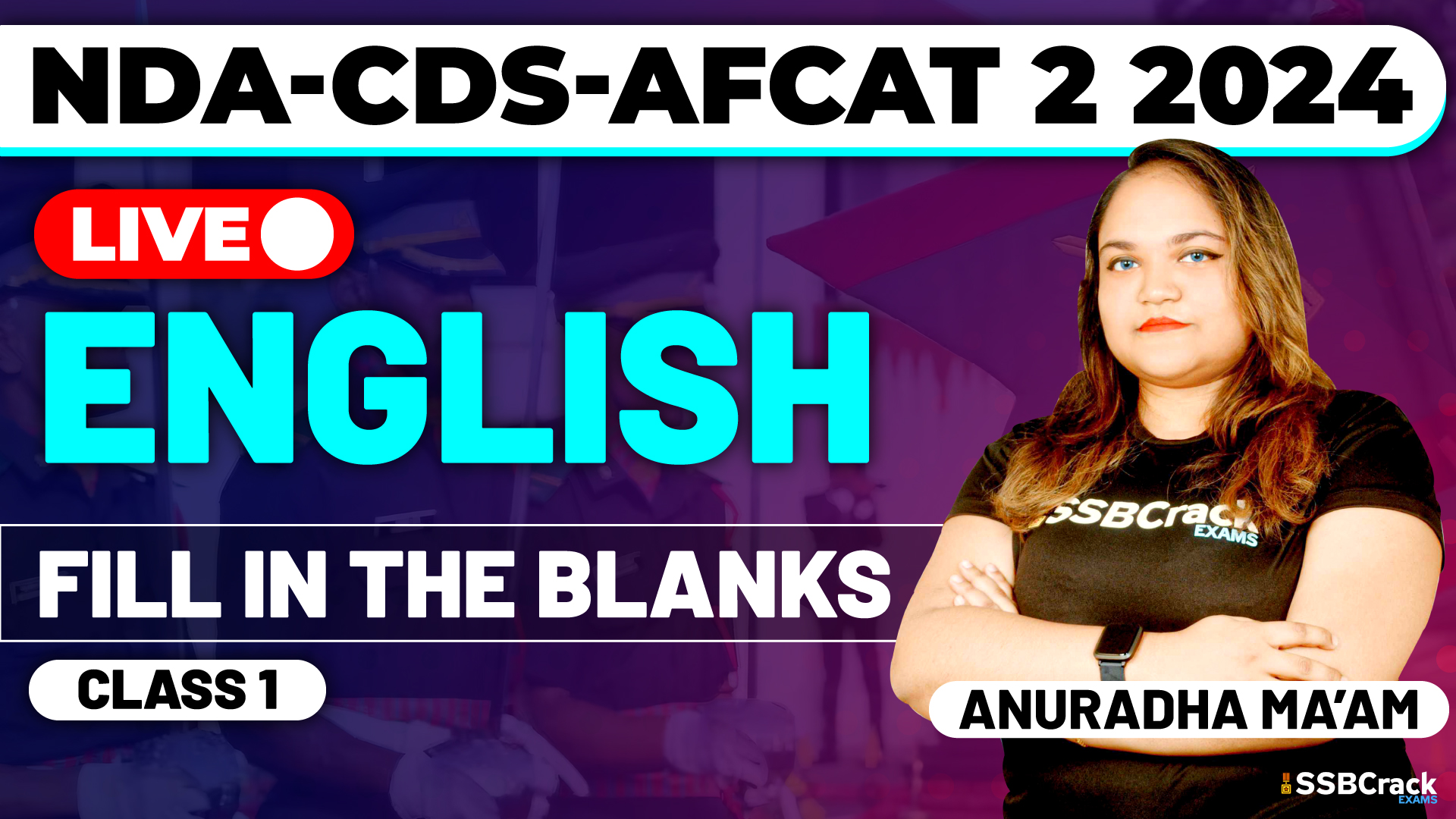The National Defence Academy (NDA), Combined Defence Services (CDS), and Air Force Common Admission Test (AFCAT) exams are critical assessments for aspirants aiming to join the Indian Armed Forces. Among the various sections tested, the English section holds significant weight, evaluating candidates’ language proficiency, comprehension, and communication skills. One essential component of the English section is the Fill in the Blanks topic, which tests a candidate’s knowledge of grammar and vocabulary. This article highlights the importance of the Fill in the Blanks topic in these competitive exams and the necessity of a robust understanding of grammar and vocabulary to excel in it.
DIRECTIONS: In the following questions, the sentence given with blank to be filled in with an appropriate word. Select the correct alternative out of the four and indicate it by selecting the appropriate option.
Q) I shall not be going to the theatre ________________.
(a)If it may snow
(b)If it snow
(c)If it snows
(d)If snowed
Ans. (c)
Q) ____________ than a hundred passengers were killed in the recent train accident.
(a)Less
(b)No less
(c)Fewest
(d)No fewer
Ans. (d)
Q) Each of these paintings ___________ made by a famous painter.
(a)are
(b)is
(c)be
(d)should
Ans. (b)
Q) This is an area of ___________ dense population.
(a)extremely
(b)totally
(c)tangentially
(d)languidly
Ans. (a)
Q) I do not think he will ever ________ the shock of his wife’s death.
(a)get by
(b)get off
(c)get through
(d)get over
Ans. (d)
For more questions, check out NDA-CDS-AFCAT 2 2024 Exam English Live – Fill in the Blanks – Class 1
Understanding the Exam Context
In the NDA, CDS, and AFCAT exams, the English section is designed to evaluate candidates’ mastery of the English language, which is crucial for effective communication and comprehension in their future roles. Fill in the Blanks questions specifically assess a candidate’s ability to understand sentence structure, contextual usage of words, and grammatical correctness.
Importance of the Fill in the Blanks Topic
1. Assessment of Grammar Proficiency
Fill in the Blanks questions are a direct measure of a candidate’s understanding of English grammar. These questions test various grammatical concepts such as tense, prepositions, conjunctions, subject-verb agreement, and more. A strong grasp of grammar is essential for constructing correct and coherent sentences.
2. Evaluation of Vocabulary Knowledge
These questions also assess a candidate’s vocabulary knowledge. Understanding the meaning of words and their appropriate usage in different contexts is critical for filling in the blanks accurately. A rich vocabulary enables candidates to select the most suitable word to complete a sentence meaningfully.
3. High Scoring Potential
Fill in the Blanks questions typically have definitive right or wrong answers, making them a high-scoring area within the English section. Well-prepared candidates can secure marks easily in this section, contributing significantly to their overall score.
4. Application Across Exams
The inclusion of Fill in the Blanks in the English sections of NDA, CDS, and AFCAT exams highlights its universal importance. This consistency means that mastering this topic can benefit candidates across multiple exams, making it an efficient study focus for those appearing for more than one of these tests.
Key Strategies for Mastering Fill in the Blanks
- Regular Reading:
- Engage in reading diverse materials such as books, newspapers, and magazines to expose yourself to various sentence structures and vocabulary usage.
- Grammar Practice:
- Regularly practice grammar exercises to strengthen your understanding of different grammatical rules. Focus on common areas tested in Fill in the Blanks questions, such as prepositions, conjunctions, and tenses.
- Vocabulary Building:
- Expand your vocabulary by learning new words daily. Use vocabulary lists, flashcards, and vocabulary-building apps to reinforce learning.
- Contextual Learning:
- Learn words and grammatical concepts in context. Understanding how they are used in sentences helps in grasping their meanings and applications more effectively.
- Practice Tests:
- Solve previous years’ question papers and take mock tests to familiarize yourself with the types of Fill in the Blanks questions asked in the exams. This also helps in improving speed and accuracy.
Benefits of a Strong Command of Grammar and Vocabulary
1. Enhanced Communication:
A robust understanding of grammar and vocabulary enables clear and effective communication, which is essential for future officers who need to convey orders and instructions accurately.
2. Improved Comprehension:
Strong grammar and vocabulary skills aid in better comprehension of written and spoken material. This is particularly useful in understanding complex instructions and technical manuals that officers often encounter.
3. Confidence Boost:
A good command of grammar and vocabulary instills confidence in candidates, enabling them to perform better in verbal interactions and written tasks.
Conclusion
The Fill in the Blanks topic is a crucial element of the English sections in the NDA 2 2024, CDS 2 2024, and AFCAT 2 2024 exams. Mastery of this topic requires a deep understanding of grammar and a rich vocabulary. By incorporating regular reading, practicing grammar exercises, building vocabulary, and taking practice tests, candidates can significantly enhance their proficiency in this area. A strong command of grammar and vocabulary not only helps in scoring well in the exams but also equips future officers with the language skills necessary for effective communication in their professional roles.







